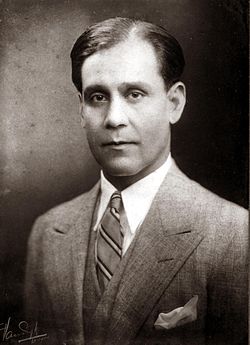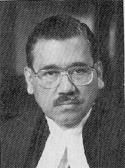| Part of a series on |
| Aligarh Movement |
|---|
 |
The chancellor of Aligarh Muslim University is the ceremonial head of the university. The vice-chancellor of Aligarh Muslim University is the executive head of the university.
| Part of a series on |
| Aligarh Movement |
|---|
 |
The chancellor of Aligarh Muslim University is the ceremonial head of the university. The vice-chancellor of Aligarh Muslim University is the executive head of the university.
The chancellors of AMU are as follows. [1]
| No | Name | Portrait | Tenure |
|---|---|---|---|
| 1 | Sultan Jahan Begum Begum of Bhopal |  | December 1920 – May 1930 |
| 2 | Hamidullah Khan Nawab of Bhopal |  | September 1930 – April 1935 |
| 3 | Mir Osman Ali Khan Nizam of Hyderabad |  | August 1935 – November 1947 |
| 4 | Syed Raza Ali Khan Nawab of Rampur | November 1947 – January 1953 | |
| 5 | Taher Saifuddin 51st Dā'ī al-Mutlaq of the Dawoodi Bohra |  | April 1953 – April 1965 |
| 6 | Hafiz Ahmad Saeed Khan Nawab of Chhatari |  | December 1965 – January 1982 |
| 7 | Akhlaqur Rahman Kidwai |  | Aug. 1984 – July 1992 |
| 8 | A. M. Khusro |  | July 1992 – August 1995 |
| 9 | Hakim Abdul Hameed |  | August 1996 – August 1999 |
| 10 | Mohammed Burhanuddin 52nd Dā'ī al-Mutlaq of the Dawoodi Bohra |  | August 1999 – October 2002 |
| 11 | Aziz Mushabber Ahmadi former Chief Justice of India |  | (September 2003 – 13 September 2006, January 2007 – January 2010) |
| 12 | Mufaddal Saifuddin 53rd Dā'ī al-Mutlaq of the Dawoodi Bohra | April 2015 – present | |
The vice-chancellors of AMU are as follows. [2]
| No. | Name | Image | Term of office | Refs | |
|---|---|---|---|---|---|
| Assumed office | Left office | ||||
| 1 | Mohammad Ali Mohammad Khan | 1 December 1920 | 28 February 1923 | [3] | |
| – | Nawab Mohammad Muzammilullah Khan Sherwani (acting) | 12 March 1923 | 31 December 1923 | [4] | |
| 2 | Sahibzada Aftab Ahmad Khan | 1 January 1924 | 31 December 1926 | [4] | |
| 3 | Nawab Mohammad Muzammilullah Khan Sherwani | 1 January 1927 | 8 February 1929 | [5] | |
| – | Sir Shah Muhammad Sulaiman (acting) | 9 February 1929 | 19 October 1929 | [6] | |
| 4 | Ross Masood | 20 October 1929 | 30 April 1934 | [6] | |
| 5 | Ziauddin Ahmad | 19 April 1935 | 29 April 1938 | [7] | |
| 6 | Sir Shah Mohammad Sulaiman | 30 April 1938 | 13 March 1941 | [8] | |
| (5) | Ziauddin Ahmad | 24 April 1941 | 26 December 1946 | [9] | |
| – | Khan Bahadur Obaidur Rahman Khan Sherwani (acting) | 27 December 1946 | 19 April 1947 | [10] | |
| 7 | Zahid Husain | 20 April 1947 | 7 August 1947 | [9] | |
| – | Khan Bahadur Obaidur Rahman Khan Sherwani (acting) | 8 August 1947 | 16 October 1947 | [10] | |
| 8 | Nawab Mohammad Ismail Khan | 17 October 1947 | 28 November 1948 | [11] | |
| 9 | Zakir Husain |  | 30 November 1948 | 15 September 1956 | [12] |
| 10 | Bashir Hussain Zaidi | 7 October 1956 | 6 November 1962 | [13] | |
| 11 | Badruddin Tyabji | 7 November 1962 | 28 February 1965 | [14] | |
| 12 | Ali Yavar Jung | 1 March 1965 | 5 January 1968 | [15] | |
| 13 | Abdul Aleem | 6 January 1968 | 3 January 1974 | [16] | |
| – | Khaliq Ahmad Nizami (acting) | 3 January 1974 | 30 August 1974 | [17] | |
| – | Harbans Lal Sharma (acting) | 30 August 1974 | 20 December 1974 | [17] | |
| 14 | A. M. Khusro |  | 20 December 1974 | 14 December 1979 | [18] |
| – | Mohammad Shafi (acting) | 14 December 1979 | May 1980 | [19] | |
| – | Jagan Nath Prasad (acting) | May 1980 | June 1980 | [20] | |
| – | Qamar-ul-Hasan Faruqi (acting) | June 1980 | 12 June 1980 | [20] | |
| 15 | Saiyid Hamid | 12 June 1980 | 26 March 1985 | [21] | |
| – | K. M. Bahauddin (acting) | 26 March 1985 | 7 April 1985 | [22] | |
| 16 | Syed Hasim Ali | 8 April 1985 | 4 October 1989 | [22] | |
| – | Wasi-ur-Rahman (acting) | 4 October 1989 | 5 July 1990 | [23] | |
| – | Ashok Bal (acting) | 6 July 1990 | 31 August 1990 | [24] | |
| – | Mohammad Zaheer (acting) | 1 September 1990 | 3 September 1990 | [24] | |
| – | Zillur-Rehman (acting) | 4 September 1990 | 15 October 1990 | [25] | |
| 17 | M. N. Faruqui | 15 October 1990 | 14 December 1994 | [25] | |
| 18 | Mahmoodur Rahman | May 1995 | 27 May 2000 | [26] | |
| 19 | Mohammad Hamid Ansari |  | 28 May 2000 | 30 March 2002 | [27] |
| – | Mohammad Saleemuddin (acting) | 30 March 2002 | 30 April 2002 | [28] | |
| 20 | Naseem Ahmad | May 2002 | April 2007 | [28] | |
| 21 | P. K. Abdul Aziz |  | June 2007 | January 2012 | |
| 22 | Zameer Uddin Shah |  | May 2012 | May 2017 | |
| 23 | Tariq Mansoor | May 2017 | 2 April 2023 | [29] | |
| _ | Mohammad Gulrez(acting) | 2 April 2023 | 23 April 2024 | [30] | |
| 24 | Naima Khatoon |  | 24 April 2024 | Incumbent | [31] |